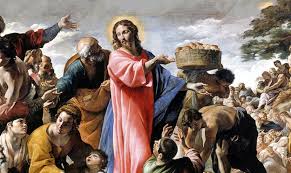HOMILY ADVENT WEEK 01 03 – Year I
Love That Satisfies Spiritual Hunger
(Is 25:6-10a; Ps 23; Mt 15:29-37)
*************************************************
“Is that all there is to my life?” This is a question many people end up asking, especially as they enter into the second half of life.
Our yearning for the fullness of life can only be satisfied by the experience of God’s unconditional love. Faith in Jesus and fostering an intimate relationship with him is the best way to experience that love which alone satisfies our spiritual hunger.
 The Gospel account today probably takes place on the Mount of the Beatitudes near the Sea of Galilee. Jesus heals all who come to him of their physical ailments. He then satisfies the physical hunger of the crowds by the miracle of the multiplication of the loaves. This is probably the one passage in the Gospels where there is such a concentration of miracles. We can ask why and what is the message for us?
The Gospel account today probably takes place on the Mount of the Beatitudes near the Sea of Galilee. Jesus heals all who come to him of their physical ailments. He then satisfies the physical hunger of the crowds by the miracle of the multiplication of the loaves. This is probably the one passage in the Gospels where there is such a concentration of miracles. We can ask why and what is the message for us?
Jesus performed miracles not to be a wonder worker, but to demonstrate the unconditional love of God for us, and elicit a response of love from us.
A volunteer at L’Arche was interviewed by the CBC one day. In the course of the interview, he touched on what he learned through his experience at L’Arche and living with the mentally challenged. Their great need was not possessions, prestige or power. It was simply to be accepted as a person of value in another’s eyes. Their cry is “Am I someone of worth in your eyes? Do you love me?”
He went on to say that cry of the poor, in their humility and vulnerability, taught him about the humility and vulnerability of God. The handicapped are unable to force anyone to love them. They simply cry out for it. He realized that same cry of the handicapped is the cry of God. God also wants to be loved, freely and intimately, and will not force us to love him at all. The cry of God for our love shows forth clearly in Jesus’ question to Peter by the lake, “Peter, do you love me?” asked three times.
The interesting play with numbers in the Gospel is an indication that the perfection of God is found in Jesus is at work, bringing about that salvation right then and there. The people were with Jesus for three days; Jesus was in the tomb for three days to redeem us. There were seven loaves of bread that he multiplied into seven baskets full of crumbs. Three and seven are perfect numbers for the Hebrew people – a sign that the presence of God was there.
The number seven also indicates this love of God is very inclusive, and includes the gentiles (and the Samaritans) whom the Jewish religious system of the time excluded. There was a sign on a temple wall forbidding gentiles to enter any further on pain of death! That attitude is just the opposite of the prophecy of Isaiah in the first reading, including all peoples and all nations. He speaks of a day when the shroud of death, the sheet of illness, the tears of sadness and the disgrace of shame will be overcome – a day when all people will rejoice in the salvation of our God. This is a not so subtle indication that Jesus is the Messiah and the Lord who would accomplish all that Isaiah prophecies for all humanity.
The Eucharist is our participation in the multiplication of the loaves. The word of God is proclaimed, and humble gifts of bread and wine are transformed by the power of the Holy Spirit into the Body and Blood of Jesus, which satisfies our spiritual hunger.
May our celebration strengthen our faith in Jesus, deepen our intimate relationship with him, grant us healing at a level even beyond our awareness, and empower us to go out to the world, baskets full of love, to spread the Good News of the reign of God present here and now.



